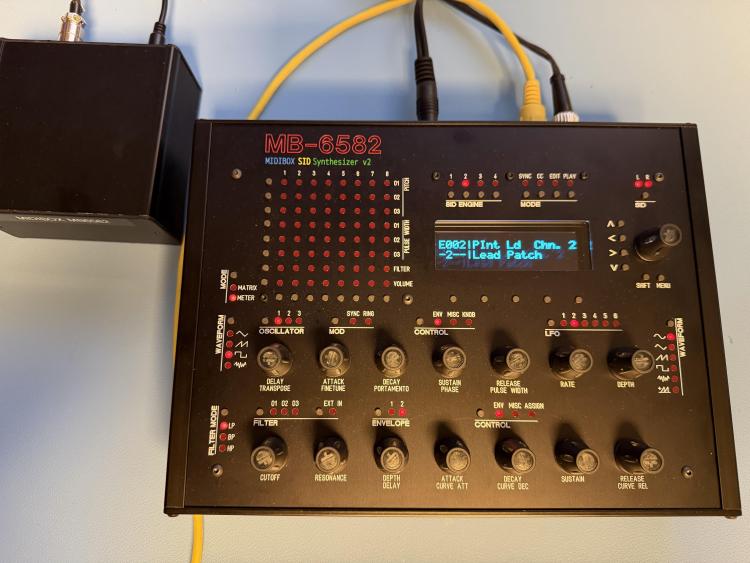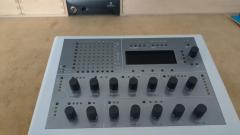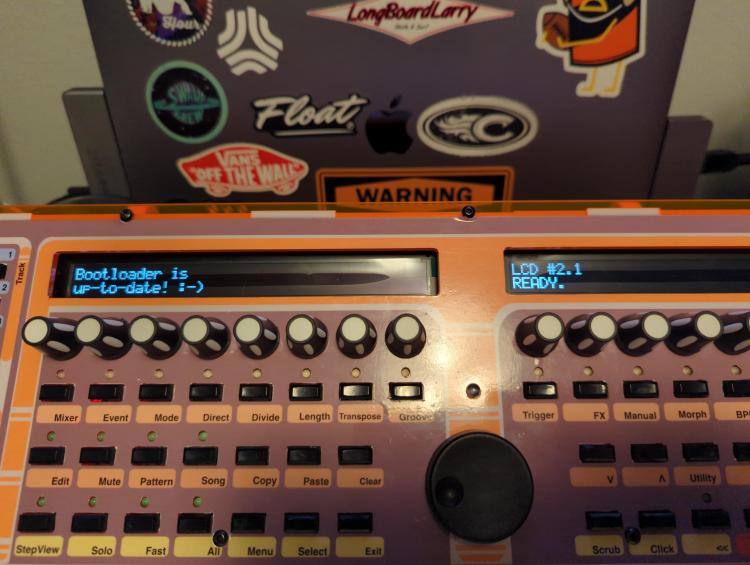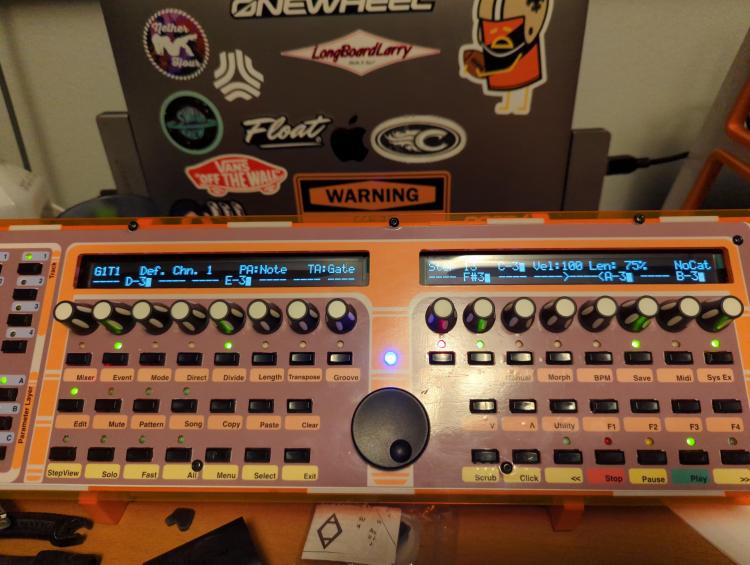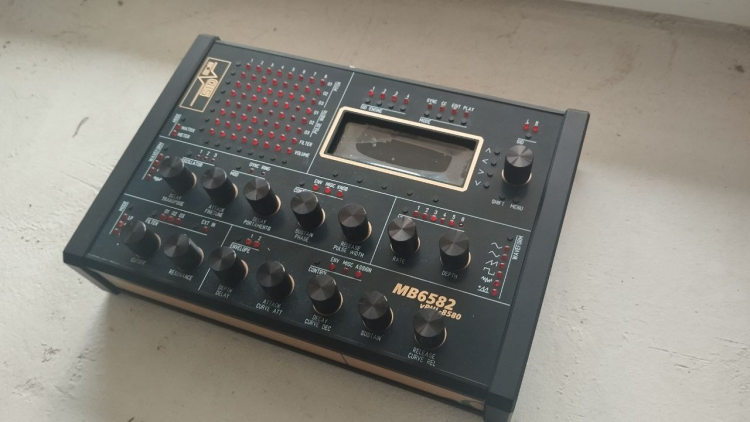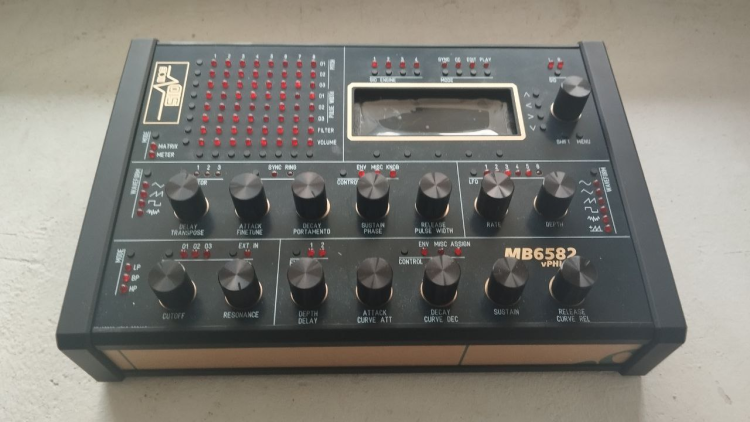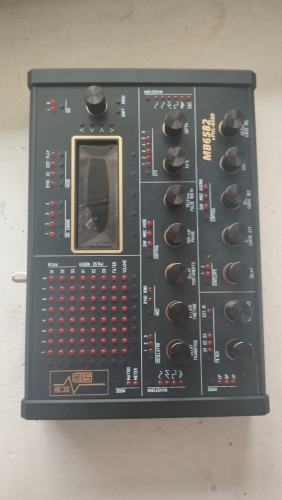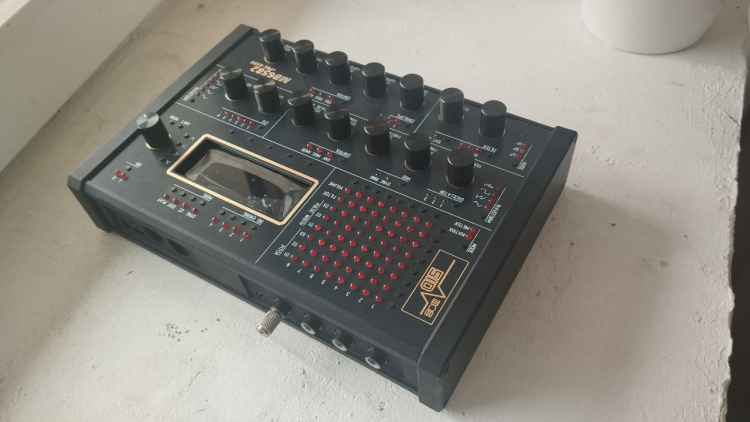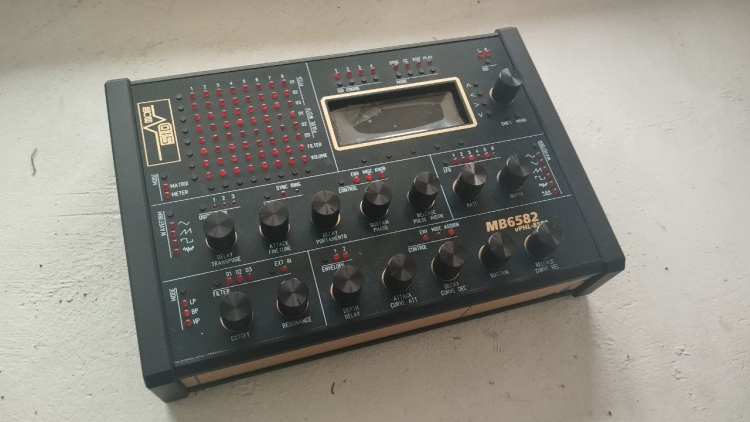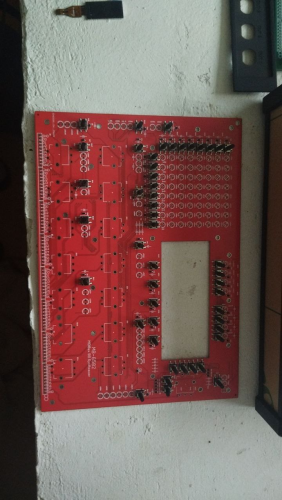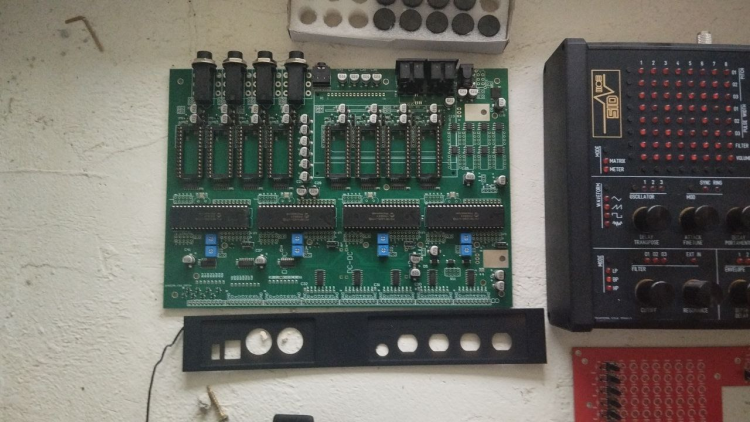All Activity
- Yesterday
-
Summary new MB6582 builds with custom case and OLED
DSL-man replied to DSL-man's topic in MIDIbox SID
- Last week
-
Hi, I might have what you're looking for. Would you be interested with original 2044 chips too?
- Earlier
-
HI Folks. Returning to projects after a long time away, I seem to have lost 3 unpopulated boards for this project.. I had one built and tested, but then found what I thought was a tube of 6 2044 chips were actualy CEM3394s. I have found a workaround using the SSI2188 and an adapter board and want to finish the filter bank I began years ago. So - does anybody have any boards they woudl like to parts with? Thanks.
-
Hi, Is it still available ? Best regards Manuel
-
banneduser joined the community
-
Hi FantomXR, do you still sell them? Thanks, Tilmann
-
selfservice started following Mega stock of faders
-
Dear all, I'm cleaning up my lab and i've found a box of about 100pcs 50kOhm double faders that i purchased long ago for a Midibox project. I have to admit i'll be very sad to send them as scrap, as they are very high quality... Whoever needs them let me know, not planning to make any money out of it, just cover shipping expenses (from Italy) and whatever you feel right to pay for them
-
Single +12V (not ~12V as on original) can be used, and it is included in the package. 12VAC is probably also supported but I do not have an appropriate power source.
- 7 replies
-
- mb6582
- midiboxsid
-
(and 1 more)
Tagged with:
-
Does it require the original twin power supply or is it running off a normal 12v supply? I imagine I would have to source it myself? thankyou
- 7 replies
-
- mb6582
- midiboxsid
-
(and 1 more)
Tagged with:
-
Hello and thank you for the interest. They can be mixed on the main PCB, so you just choose the voltage for each SID installed. Proper capacitors should be installed as well, I can arrange it before shipping. Default capacitors are set to 8580 mode. You can set the voltage separately to each of 8 SIDs, just like on original MB6582.
- 7 replies
-
- mb6582
- midiboxsid
-
(and 1 more)
Tagged with:
-
Sorry I should have clearer,could I have (for example) 4x12v and 4x9v Sid's in the unit? Not trying to be awkward but that's what I have here...4 of each.
- 7 replies
-
- mb6582
- midiboxsid
-
(and 1 more)
Tagged with:
-
Do these units cater for 12 and 9volt Sid's like the original?
- 7 replies
-
- mb6582
- midiboxsid
-
(and 1 more)
Tagged with:
-
Yeah, I know, I’m like six years late to the conversation, but… I was looking into the ESP32 myself recently, but for an entirely different purpose. From what I understand, there are two hardware UARTs on the ESP32 that can be accessed on the dev kit v1 board. I have further come to understand that the device can be configured as an i2c slave with a configurable address using the Arduino IDE and the wire library. My thought is this: configure the ESP32 as an i2c slave to provide 2 DIN MIDI outs (plus perhaps Bluetooth MIDI) to my stm32 based MIDIBox sequencer build, in opposition to the PIC-based i2c MIDI solution, as it is getting harder and harder to program PICs in the modern age. Does this sound like it could be a feasible solution, TK?
-
Hi @Wilba, I have finished my build of the MB6582 and would like to have a serial-number to be able to officially finished this project. I tried to login here at the builder_list site with my credential from this forum I get an error. Is I could not see "sign in" button I wonder how I can connect my forums accounts? Thanks!
-
smak changed their profile photo
-
Hello, I hope someone can help me. I am trying to have 3 different layers of sound generated with 1 physical keyboard. I.e play piano with strings :) I have 2 physical keybeds Keyboard= 1 and Keyboard= 2 Each of them is assigned to 3 different channels on different output ports. When I play one key I have desired result only on first press. I.e press note C and it plays on 3 different channels. On second press I have three notes generated but all on the same channel. Here is my config file: # KEYBOARD hardware KEYBOARD n=1 rows=16 dout_sr1=1 dout_sr2=2 din_sr1=1 din_sr2=0 din_inverted=0 break_inverted=0 din_key_offset=32 \ make_debounced=1 break_is_make=0 \ scan_velocity=1 scan_optimized=0 note_offset=36 \ delay_fastest=5 delay_fastest_black_keys=0 delay_slowest=100 EVENT_KB id= 11 hw_id= 1 type=NoteOn chn=1 key=any use_key_number=1 range=0:127 ports=00010000000000000000 EVENT_KB id= 15 hw_id= 1 type=NoteOn chn=4 key=any use_key_number=1 range=0:127 ports=10000000000000000000 EVENT_KB id= 16 hw_id= 1 type=NoteOn chn=5 key=any use_key_number=1 range=0:127 ports=10000000000000000000 KEYBOARD n=2 rows=16 dout_sr1=3 dout_sr2=4 din_sr1=3 din_sr2=0 din_inverted=0 break_inverted=0 din_key_offset=32 \ make_debounced=1 break_is_make=0 \ scan_velocity=1 scan_optimized=0 note_offset=48 \ delay_fastest=5 delay_fastest_black_keys=0 delay_slowest=100 EVENT_KB id = 12 hw_id= 2 type=NoteOn chn= 1 key=any use_key_number=1 range=0:127 ports=10000000000000000000 EVENT_KB id = 13 hw_id= 2 type=NoteOn chn= 2 key=any use_key_number=1 range=0:127 ports=10000000000000000000 EVENT_KB id = 14 hw_id= 2 type=NoteOn chn= 3 key=any use_key_number=1 range=0:127 ports=10000000000000000000 Here is what I see on Mios Studio. First press after resetting: [179820.721] 90 48 01 Chn# 1 Note On C-4 Vel:1 [179820.721] 91 48 01 Chn# 2 Note On C-4 Vel:1 [179820.722] 92 48 01 Chn# 3 Note On C-4 Vel:1 [179820.927] 92 48 00 Chn# 3 Note Off C-4 (optimized) [179820.927] 92 48 00 Chn# 3 Note Off C-4 (optimized) [179820.928] 92 48 00 Chn# 3 Note Off C-4 (optimized) As you can see NoteOn seems to be OK, but then we see all three notes on channel 3 Then let's play the same note again: [179974.952] 92 48 1d Chn# 3 Note On C-4 Vel:29 [179974.952] 92 48 1d Chn# 3 Note On C-4 Vel:29 [179974.952] 92 48 1d Chn# 3 Note On C-4 Vel:29 [179975.626] 92 48 00 Chn# 3 Note Off C-4 (optimized) [179975.626] 92 48 00 Chn# 3 Note Off C-4 (optimized) [179975.628] 92 48 00 Chn# 3 Note Off C-4 (optimized) Plays all three notes on the same channel, same for notes OFF. Anyone can help me understanding what is wrong?? Regards, Bartosz
-
Need some help setting up OLED displays [solved]
baconjuice replied to baconjuice's topic in MIDIbox SEQ
Good news everybody! I got my OLED displays working!! The displays in question are Focus LCDs 0402A-CW-SW3, I ended up downloading the mios tools from GitHub: https://github.com/midibox/mios32 And the mios toolchain for macOS here: http://www.ucapps.de/mios32_c.html And compiled the bootloader updater make file at: ./mios32/bootloader/updater Uploading the resulting .hex file now included the lcd_type 0x02:CLCD_PP which allows the LCDs to behave properly. They were working with the lcd_type 0x01:CLCD_DOG but that configuration was not handling the line break correctly. Basically, after setting the clcd_dog option and sending the store command the "Bootloader is up to date! :-)" message was all on one line instead of split between the 2 lines. Now it works as expected. Hopefully this helps the next brave soul that attempts this! :D Here is they are happy in my SEQ V4, pardon my messy desk. XD Thanks everyone and many thanks TK for all your awesome work!!! -
I'm upgrading my SEQ v4 with some OLED displays. I was able to get them working by changing lcd_type in the bootloader to 0x01: CLCD_DOG. However, the text is only being written on the top line. I've been trying to troubleshoot this and there is supposed to be a new lcd_type for this display in the boot loader (0x02: CLCD_PPP) but I'n not seeing that option when I run the lcd_types command. Is there a different version of the boot loader that I need? Here is my output from MIOS Studio: [595397.479] Initialize LCD #1 [595397.536] Initialize LCD #2 [595397.592] [595397.592] ==================== [595397.594] Bootloader 1.018 [595397.604] ==================== [595397.607] [595397.618] Checking Bootloader... [595397.671] No mismatches found. [595397.673] The bootloader is up-to-date! [595397.689] You can upload another application now! [595397.710] Or type 'help' in MIOS Terminal for additional options! [595417.029] lcd_types [595417.030] List of known LCD types: [595417.030] 0x00: CLCD [595417.031] 0x01: CLCD_DOG [595417.031] 0x80: GLCD_CUSTOM [595417.031] 0x81: GLCD_KS0108 [595417.031] 0x82: GLCD_KS0108_INVCS [595417.031] 0x83: GLCD_DOG [595417.031] 0x84: GLCD_SSD1306 [595417.031] 0x85: GLCD_SSD1306_ROTATED [595417.031] 0x86: GLCD_SED1520 [595417.031] You can change a LCD type with 'set lcd_type <value>' [595417.031] Please note that newer types could have been integrated after this application has been released! Thanks in advance for the help!
-
Just got in the first set of pcb's i designed for controlling the XV1A synth, nothing over the top some simple one sided pcb's from china, 10 of them for around £8. To get them done in the UK was around £140 excluding vat and delivery which was a shame. Just about 2 weeks delivery from jlc pcb, I am getting a couple of different multi layer ones done after xmas one i finish them in Altium.
-
Hi everyone, After nearly a decade of silence, we are resuming our project. What once was merely a concept is gradually taking shape as a tangible endeavor, culminating in my son's high school graduation. I shall endeavor to share updates and photographs of the project in the coming weeks. The initiative is based on the Midibox NG platform, complemented by additional software written in Python that operates on the host side. I wonder whether anyone is still engaged with Midibox NG, as the last official version was released in 2018, and the most recent version available on GitHub dates back to 2020. I ask because I will likely have numerous questions, and I wish to share insights and ideas. I regard Midibox NG as an exceptional concept; it would be a shame if it were left unfinished. Best regards, Bartosz
-
PM sent, thank you :)
- 7 replies
-
- mb6582
- midiboxsid
-
(and 1 more)
Tagged with:
-
Hello and thank you for the interest. Replied to PM and in the MB6582 thread. sammichFM is planned to be optimized in design and I plan a small batch in the new year.
-
bruno started following My new MB6582-compatible Midibox SID
-
Thanks for keeping this projects alive I will try to buy one of them next month if its possible again thanks so much for your work Best regards
- 7 replies
-
- 1
-

-
- mb6582
- midiboxsid
-
(and 1 more)
Tagged with:
-
Hello how much will cost the mb6582? and also If you plan to build a sammichFM let me know
-
Sgw32 started following New MB6582-compatible synth and My new MB6582-compatible Midibox SID
-
Hi everyone! Over the past few months, I’ve completed the engineering of a brand-new MB6582-inspired synthesizer, designed entirely from the ground up. While fully compatible with the classic Midibox Midibox SIDV2 architecture, this new design focuses on modern manufacturing, clean layout, and improved reliability. The name - "PHL8580" What’s New? Premium factory-made ENIG front panel PCB 4 PIC cores inside, maintaining MB6582-style operation All PCBs, including the front panel, PCB factory manufactured Support for ArmSID, Kung Fu SID, and original 6581 / 6582 / 8580 chips Clean, modern internal design with easy assembly Due to licensing, production and sales is currently limited to 10 units, therefore I will be offering 9 units for sale (I'll save one for myself). I am offering it here. The price is well below other available MB6582 assemblies on the market, without the SIDs its only 420 EUR, delivery from the EU: Actually, I want to ask the founders and core developers to broaden the production. What am I offering? As I see no major updates over few years, I want to add new fresh air to the development and so - If I receive permission to manufacture these synthesizers without listed limitations, I will: Developing and improving the software/electronics side of the project free of charge Donating financially wherever the original authors request Releasing the PCB sources for the new-engineered MB6582-compatible synths, as well as for my sammichSID and sammichFM clones, so anyone can build these legendary projects themselves. I will release everything including frontpanels, CAD files and so on - so everyone can assemble the devices at home. Creating a next-generation MB6582 on MIOS32, running on an STM32 core - a modern evolution of the classic design I will try to record some videos and publish on YouTube soon. Photos (also take a look at the fleamarket thread):
-
- midiboxsid
- mb6582 sid
-
(and 1 more)
Tagged with:
-
Hello everyone! Over the past few months, I’ve engineered a brand-new MB6582-style synthesizer, deeply inspired by the original Midibox MB6582 but redesigned completely from scratch for improved reliability, easier assembly, and modern component availability. Key new features: Premium ENIG front panel PCB - durable, professional finish 4 PIC cores onboard - full MB6582-compatible architecture Factory-manufactured PCB set, including the front panel Supports ArmSID, Kung Fu SID, or original 6581/6582/8580 chips Clean internal layout, solid build, and high-quality components Prices: Base unit: 420 EUR + shipping With Kung Fu SID set: 499 EUR ArmSID pricing available upon request. Availability: The license allows producing 10 units, so I’m offering 9 units for sale. 1 unit is in stock right now Additional units can be assembled in 3-4 weeks If I receive permission to sell more broadly, I plan to lower the price and release all design files as open source I will make a separate thread in Latest News or somewhere else Photos PCBs and components:
- 7 replies
-
- 1
-

-
- mb6582
- midiboxsid
-
(and 1 more)
Tagged with:

